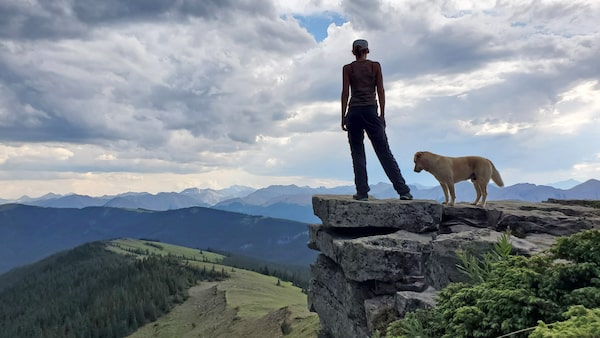
Melanie Vogel and Malo the dog look out at the approaching thunderstorms on Cox Hill, in Alberta's Kananaskis country, the highest point of the Trans Canada Trail.Photos courtesy of Melanie Vogel
Grand adventures start with simple resolutions. And so it happened one day that Melanie Vogel decided to walk alone from one end of Canada to the other.
She’d read about the Trans Canada Trail, the longest recreational trail network in the world, in a magazine in the public library. She felt restless in Toronto, where the concrete ground didn’t breathe, the buildings closed in on her, and everyone was so very, very busy. In German, her first language, she’d think “Die Decke fällt mir auf den Kopf.” The ceiling is falling on my head.
“Do you know how big Canada is?” the skeptics said, while she gathered supplies, saved what she could from her paycheque, and learned how to build a fire in the rain.

Day 1 of Ms. Vogel's journey in Cape Spear, N.L., on June 2, 2017.
On June 2, 2017, she took her first official step in the fog at Cape Spear, the most easterly point in Newfoundland. If she made it to Victoria, following the northern route, she would become the first woman to hike the Trans Canada Trail to all three oceans.
The trail runs 20,000 kilometres by land – Ms. Vogel’s route – and another 8,000 across water. Started 30 years ago by a Quebec geographer and an Alberta builder, it now passes through 15,000 communities and 32 national parks and historic sites. It is maintained with public dollars and private donations. New spurs continue to be added across the country.
Completing the trail is an arduous task reserved for a determined and resilient few.
A 24-year-old named Sarah Jackson hiked it from the Pacific to the Atlantic Ocean between 2015 and 2017. The next year, Dana Meise, a forestry worker from Prince George, B.C., became the first man to cover east, west and north, piece by piece, over a decade. While Ms. Vogel walked the trail, B.C. filmmaker Dianne Whelan finished her own six-year trip, variously hiking, biking, skiing and paddling the water portion.

Blisters from a new pair of trail runners demonstrate the painful realities of hiking.
The trail is not all easy walks through manicured, wooded paths. Ms. Vogel hiked through forests and wheat fields and mud, scorching sun, snow and hailstorms, along the Trans-Canada Highway around Lake Superior, up to Tuktoyaktuk in the Northwest Territories, and over the Rocky Mountains.
She carried her gear in a backpack, pulled it on a sled and then a wagon, and finally pushed a stroller. She encountered the best kind of people, and the worst kind of man, and the latter frightened her more than the wolves and grizzlies. She was trapped in the Yukon by a pandemic lockdown. But by then, she was no longer alone; she had fallen, unexpectedly, in love.
She discovered that Canada was bigger and more beautiful than the skeptics back in Toronto could even imagine. Along the way, in the silence and freedom of the trail, she discovered herself.

Sunsets like these at North Cape, PEI, were part of the natural beauty that Ms. Vogel got to enjoy along the trail, which spans 32 national parks and historic sites.
:format(jpeg)/cloudfront-us-east-1.images.arcpublishing.com/tgam/EABQSV2K5NBVREAXTXSO2HHHYE.jpg)
:format(jpeg)/cloudfront-us-east-1.images.arcpublishing.com/tgam/Z7RF34LTUVH3XJKQGP7HLA35IA.jpg)
:format(jpeg)/cloudfront-us-east-1.images.arcpublishing.com/tgam/FXCCA6X52NDL3BM3VGD5NKKM44.jpg)
:format(jpeg)/cloudfront-us-east-1.images.arcpublishing.com/tgam/PXEJ5RGH6RCYNBNRZF6TIUGDU4.jpg)
June 19, 2017, Clarenville, N.L.
“I am turning into a mad woman.” – Facebook post
Ms. Vogel was not, it’s fair to say, a seasoned, long-distance hiker. At 42, she’d never slept in a tent in sub-zero temperatures, never lived off oatmeal for months. She chose the trail because she needed an escape she could afford, and wanted to see Canada, the country that had been her home since she moved from Germany in 2008.
For a year, she saved what she could from her two jobs, working as a co-ordinator for a pair of Business Improvement Areas in Toronto, living a minimalist life. She charmed companies into donating gear, received a small expedition grant from the Royal Canadian Geographical Society, and private donations, as word of her trip spread online. When her savings dwindled, she made $1,400 picking morels for four days near the Yukon’s Klondike Highway. But the trail is a cheap way to travel, especially if you’re not shy about where you pitch your tent.
To prepare, she’d read books about camping, watched YouTube videos and taken a survival course. But during those first weeks of hiking, she is not prepared for the pain. Her 60-pound backpack hobbles her 130-pound frame, chafing the skin raw on her shoulders, her hips and her spine. Blisters pucker the bottom of her feet, and, later, grow under her toenails. On windless days, mosquitoes settle on her arms like a sleeve of black wings, chase her down the trail, torment her when she rests. To avoid chemicals, she smears garlic on her skin. This works – for one day. She suffers through the heat under netting. She finally showers in bug spray.
By fall, though, she stands straighter, breathes more easily. She’s become creative with the oatmeal, dressing it up with nuts and cranberries and cinnamon, offered from the cupboards of people who host her along the trail. On the advice of another hiker, she gives herself permission to buy a real pillow and a French press for her morning coffee.
She eventually tosses the razor and cosmetics in her bag. She sheds her vanity by necessity, and wears the same shirt five days in a row. She sleeps, even through the coyote howls.
She is, she thinks, slowly becoming wild, like the nature around her.

Jim, an 89-year-old Nova Scotian, made an impression on Ms. Vogel when she stopped to ask whether she could camp in his yard.
Aug. 20, 2017, Inverness, N.S.
“Another day I walked and observed, listened, laughed and learned. And smiled. At complete strangers.”
On the trail, she finds the connection she has been missing in the city. In September, near Clifton, N.S., she stops at a house, looking for a yard to pitch her tent, and meets Jim, an 89-year-old widower, who invites her to stay. For two days, they have meandering conversations about politics and materialism and history. Jim is charming and wise in the way of kindly grandfathers, winking at her when he makes a joke; he is also dying, he tells her, of lung cancer.
“I am so glad you knocked on my door,” he says. When he walks her down to the mailbox to start her back on the path, they are both crying; they know what goodbye means. This will happen often: She arrives a stranger, usually at twilight, and departs by breakfast, a friend. It’s a gift the trail gives, again and again.

Fall leaves crunch underfoot on the Confederation Trail. By Oct. 17, 2017, she had walked more than 2,000 kilometres.
Oct. 19, 2017, Mount Stewart, PEI
“Be kind with me, crisp cold air. Let me be safe, darkness. Let the sky sparkle for me.”
In the setting sun, she says, everything, and everyone, feels more suspicious, more dangerous. With the days shortening, she spends more time in the dark. Outside Sackville, N.B, she walks late into the night for the first time, 20 kilometres for four hours along a thick forest trail, her headlamp flashing shadows in the trees, and her footsteps crunching along the crusty ground. The echo makes it sound as if someone else follows, just behind her. Eventually, she will come to appreciate the tension of walking at night, the way her senses sharpen. “You feel more alive,” she says. But this first time, she is fighting her fear of what creeps in the dark. Stopping is not an option: There’s a winter sleeping bag and a place to stay waiting for her in the town ahead. So she sings, making up nonsense lyrics, and walks on.
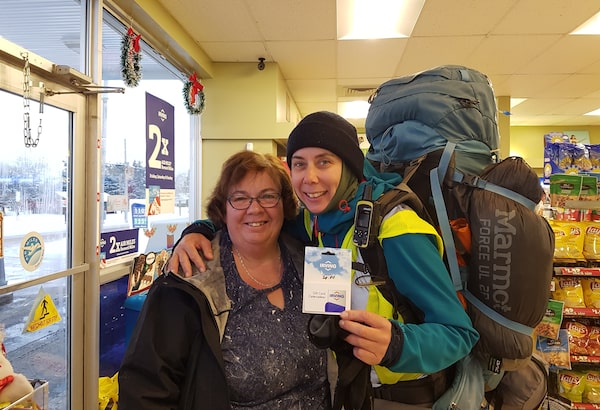
When Ms. Vogel stopped at a gas station in Grand Bay-Westfield, N.B., looking for water, she left with hugs and a gift card from Brenda, a local with whom she shared her story. '"I want to do at least something," she said after she heard I am already well-taken care of with people hosting me along the way," Ms. Vogel says. 'Her genuine heart was incredibly beautiful.'
Jan. 23, 2018, Saint-Jacques, N.B.
“Walking makes me realize what it means to get somewhere.”
At first, she worries about staying on schedule, still keeping an urban clock. But walking simplifies life. You have time to study what lies ahead. To be mentally still, while instinctively moving. “When you walk,” Ms. Vogel says, “you spend a million moments in your own head.”
Some days, not much happens; she plods along. For long stretches of the trail, she sees no other hikers. Life becomes simple. She lives by the rising and setting of the sun.
Her first pair of hiking boots wears out after 2,500 kilometres, just before the Quebec border.
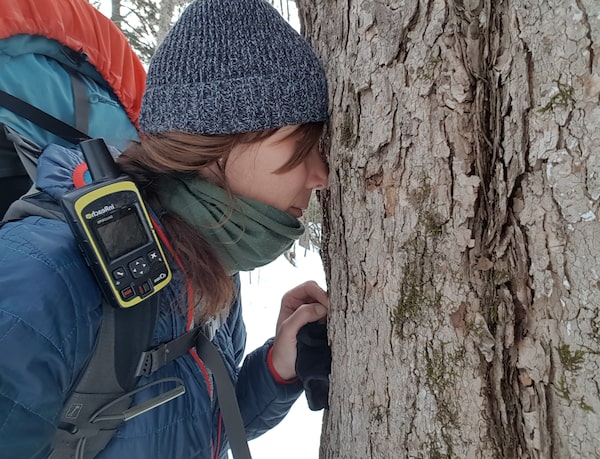
'Hug a tree and feel loved,' says Ms. Vogel, shown following her own advice near Mont-Orford, Que.
March 19, 2018, near North Hatley, Que.
“The only way to remain sane is to go outside.”
She sometimes misses the ease of civilization; hot showers, a real bed, her own kitchen. But that luxury, she knows, is also filled with boredom. A modern life is consumed with perfection, with not failing. On the trail, you learn that nature is messy and flawed, and yet, she says, it still has meaning, a right to exist.
Other rules don’t matter either: “The outdoors is not about physical strength, or manning up, or having balls,” she says. On the trail, she feels free from expectation. “I do not worry if my hair isn’t brushed, or if I have dirt under my fingernails, or a hole in my shirt. There is no judgment in nature. We are allowed to just be.”
She hopes the contentment she feels will seep so deeply into her bones that it becomes part of her DNA, when she must return to her other life.
Aug. 27, 2018, headed to Bear Lake, Ont.
“I move on and on. From one story to another. With distance comes clarity and reflection.”
Outside Huntsville, Ont., she approaches a man and his friend to see if they’d refill her water bottle. The sun is setting, and she still has a walk through the woods before she can stop. The man takes forever to fill her bottle and then he asks if she wants to spend the night. “You probably haven’t had a man in a while,” he says.
“No thank you,” she answers, overly polite, like she’s trying not to startle an animal. “I can’t even score with a hiker,” the man laughs to his friend, while she packs up to go. The friend says nothing. “Maybe I will come and find you later,” the man calls after her.
The minute she is out of sight, panic overwhelms her. It is getting dark, quickly. She begins to jog down the trail, toward a road, where there might be other, safer people. She tries calling a friend, but she is boarding a plane and can’t talk. Her phone battery is dying. She films a video, still moving, spilling out words, angry and crying at the same time. “This scares me,” she says to the camera, as if speaking directly to her harasser. “You know what? This is for you.” She roars with frustration. She is prepared to face a bear, to brave the woods in the dark; she hates, that as a woman alone, her biggest fear is not a wild animal on four legs, but one of her own kind.
“This fear is real,” she says. “It makes me so mad. I don’t want to feel vulnerable.”
She reaches the road, and sees a woman sitting on a porch. She is weeping as the adrenalin drains from her body. She asks the woman for a hug, which is offered freely. “I think I just needed to feel that everything was going to be okay.” The woman invites her to spend the evening, and in the morning, her equilibrium is restored. She never sees the man again. But she never forgets him either.
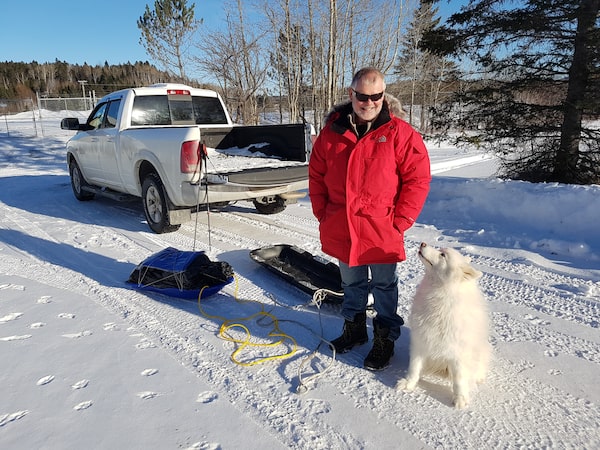
Charles from Edmundston, N.B., with dog Sasha and the expedition sled he gave Ms. Vogel, was one of the people who helped along her journey.
Sept. 30, 2018, Blind River, Ont.
“Kindness hits me sometimes with such a surprise that I break out in tears.”
That man, however, is an outlier. Instead, she finds breathtaking generosity among strangers. At an Ontario Tim Hortons, she stops for a hot chocolate and free WiFi. A woman she meets there gives her $100 so she can sleep in a hotel for the night, and not her tent.
When she walks along the busier stretches of the trail, locals bring her coffee, muffins and dry socks. She sleeps in backyards and guest bedrooms. Following on Facebook, her “trail angels,” too many to name, call ahead to friends at her next destination so she has a dinner invitation waiting.
Charles, in Edmundston, N.B., upgrades the kid’s sled she was using for her gear in winter, with his old expedition toboggan. Roy, a Newfoundlander, surprises her with a bowl of hot chowder on Highway 64, near Cleardale, Alta. While circumnavigating Lake Superior, she watches a trucker pull over on the Trans-Canada up ahead, hop out of his cab, and then drive off again. When she reaches the spot, she finds two apples and two bottles of water, left as a gift. Truckers come to represent safety; she sleeps soundly in her tent, when a tractor trailer joins her at a highway pullout, even though she breathes exhaust fumes all night.
It’s unexpected, all these people who don’t know her, showing such care. In Souris, Prince Edward Island, she takes a ferry detour to the Magdalen Islands and dines by candlelight with Sylvie and Jacquot, because the power is out in town. Why spend the evening with a stranger, she asks them, using Google to translate her English to French. “If you have a good time because of me, I want us to remember these sweet moments together,” Jacquot translates back. “You must not always make things too complicated.”
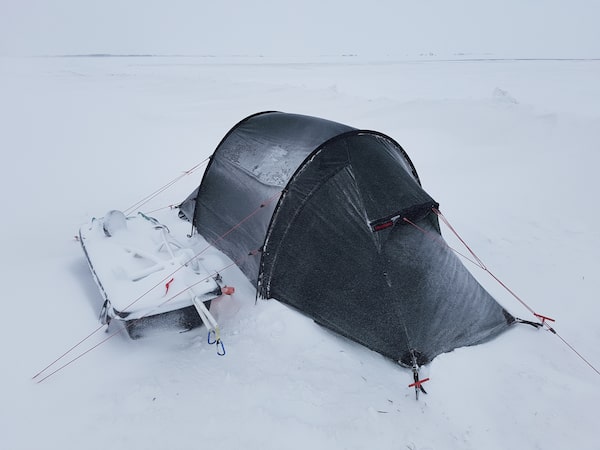
Ms. Vogel pitches her tent on Manitoba's Crow Wing Trail.
March 18, 2019, near Emerson, Man.
“What’s the greater challenge? Winter or spring, freezing or drowning in the Manitoba prairies?”
There are moments of pure misery. Long days when she is tired of being cold and wet and sore. She cries, sometimes, while she walks, out of frustration and exhaustion.
Taking the 110-kilometre stretch of road from the Peavine Métis Settlement to Peace River, in northern Alberta, pulling her gear on a wagon, she becomes trapped in the gumbo mud, which clumps like hardening concrete on the wheels and her boots. Sections of the road are flooded by beaver dams.
It rains hard, and then snows, and her feet are never dry. Three of her toes balloon purple and go numb. Turning back is impossible and moving forward feels impossible. On the fifth day, two hunters in a pick-up truck give her a lift. (She returns to the spot a few days later to continue, when cold has frozen the mud.)
This will become her worst time on the trail, narrowly beating the two-day trudge up Steamboat Mountain on the Alaska Highway. In Manitoba, seared by the prairie sun, her spark also dims.
She argues with her own inner voice. “I can’t,” the voice says. “I just can’t.” You can.
“Don’t romanticize the road,” she writes later, when she has perspective again. “The road is dirty, exhausting, demanding. You are going to be peeled like an onion, stripped down layer by layer. You will meet yourself there.”

Ms. Vogel had never had a dog before Malo, but after finding him in 2019, they became inseparable. Here, he shows off an impressive find: The antlers of a bull moose, likely killed by wolves, near the Peavine Métis Settlement.
April 15, 2019, Spruce Woods Provincial Park, Man.
“What I didn’t see before, I see now because of him.”
The dog appears on the trail one day, and never leaves. He is handsome, a Labrador-Husky mix without a collar.
For weeks, even as he nestles down into her tent as if he had always been there, she looks online for his owner. She wants someone to be missing him, for his sake. But she no longer wants to give him up. She calls him Malo, after St. Malo, where they met. Maybe it’s his first real name.
He has come into her life when her spirits are flagging. Buoyed by his inherent good cheer, her enthusiasm for the trail is restored. She’s never had a dog before. Now she is struck by the love she feels for one.
In the first three weeks, Malo is sprayed by a skunk. He scratches his ear on a wire, takes off after a deer, almost kills a rooster, chases somebody’s cat up a hydro pole, and is bitten on the nose by an aggressive dog. She has to teach him not to growl around his bones, that no one will steal them any more. He barks too much, drawing attention when she wants to keep their tent hidden from passersby. He can’t walk as far, especially on pavement. Sometimes, he rides on top of their gear on the wagon she pulls, or in the stroller she acquires for the last leg.
His antics often mean pausing on the path, or a trip to the vet. She’d chosen to go alone because she didn’t want to have to make compromises for someone else. But now, here she is, catering to the stray dog who invited himself into her journey.
“For the longest time, I said I was not lonely,” she thinks, one day, Malo trotting beside her. “Maybe I was not honest with myself.”

In Inglis, Man., Ms. Vogel and Malo met Donna, who introduced them to her cows. 'She took the photo of us and before we departed, she says in a warm voice "we love our cows,"' Ms. Vogel says. 'Then she rolls away with her tractor.'
Jan. 5, 2020, Fort Nelson, B.C.
“I live by feeling, not by the time society dictates.”
She sleeps in her tent in the cold by choice and wakes up to a New Year.
For the first two years, she did everything to avoid winter camping, desperately hoping for an invite, walking until 4 a.m., looking longingly into the windows of homes as she passed, feeling like the Little Match Girl, in the Hans Christian Andersen fairy tale. She was afraid that if she stopped, she might freeze and never wake up.
Back in Le Bic, Que., her hosts, Ben and Emma, encouraged her to practise in their backyard, reminding her to use a deadman’s anchor to secure her tent in soft snow, easing her fear of what-if. “You come to trust yourself,” she says, “and your ability to survive.”
And so she wakes with Malo to the first day of 2020, beside the Alaska Highway in northern B.C., between Prophet River and Fort Nelson – her fear, as she puts it, converted to confidence. When you are afraid there is a bogeyman under your bed, she says, don’t cower in the sheets; look the first night, and again the next, and the next one after that. “You will learn there is nobody there.”
March 25, 2020, Alaska Highway between Swift River, Yukon, and Whitehorse
“I had a phone call with authorities of the Northwest Territories. The borders are closed until further notice.”
“You’re prepared for the smaller things,” she says. “Not for a pandemic.”

In March of 2020, Ms. Vogel fell asleep under the stars, and amid the howling of coyotes, in Yukon's Carcross Desert. The dunes here are what's left of an ancient glacial lake that dried up.
Sept. 22, 2020, near the Arctic Circle, Yukon
“I cried a few times on the Dempster Highway. Why? Because my heart was overflowing.”
“Imagination erupts in open spaces,” she says. The North is that place for her. Fewer people, more space, deeper silences. At a particular bend on the Dempster Highway in the Yukon, she comes over a hill, where the snowy world flows out forever in front of her, the Ogilvie Mountains jagged against the horizon, and she thinks, “There is nothing more I need.”
She goes as far as she can and stops. With the Northwest Territories closed to leisure travellers, she cannot reach the Arctic Ocean. But she won’t give up, and go home, as one government official suggests. She works for eight months at the Eagle Plains Hotel, a desolate spot on the Dempster Highway, halfway between Dawson City and Inuvik. She travels to Whitehorse and turns a 1991 Chevy van into a camper so she and Malo have a home, and more freedom to travel during the lockdowns. She tracks the COVID-19 case counts and wonders, like everyone else in the country, how long can this last?
Dec. 4, 2021, Whitehorse
“Live a little. Compromise a little. Struggle a little. I think that could make for a decent life.”
As the pandemic drags on to another year, she laments the loss of her perfect, continuous journey.
“I wasted my energy grieving,” she says, reflecting on those long, impatient months. “It would have been wiser to surrender to the things you can’t change. That’s what I know now. I did not do that.”
Finally, in April, 2022, she can begin again. It’s not easy, restarting. In the end, it takes her walk to the Arctic Ocean, then across the gravel roads of Alberta to the Rockies, to feel truly content on the trail again.
:format(jpeg)/cloudfront-us-east-1.images.arcpublishing.com/tgam/5POUUP6DZVAQZMSPVWZIPKUKLU.jpg)
:format(jpeg)/cloudfront-us-east-1.images.arcpublishing.com/tgam/C3TZKD7TZFHDNNBZGKBIBWQHAE.jpg)
:format(jpeg)/cloudfront-us-east-1.images.arcpublishing.com/tgam/QU75SWHRZFEJJCYNYAAQN3YILY.jpg)
Aug. 9, 2022, High Rockies Trail, Alta.
“It finally happened.”
Everyone always wants to know if she ran into a grizzly bear. But in truth, the special moments were with smaller creatures – the butterfly that lands on her hand, the gray jay that snatches a piece of bread from her mouth, the turtle shuffling across the road. In those encounters, you feel part of nature, not threatened by it. A coyote sniffing around her tent, or a wolf stalking close by – they only made clear that she is a foreigner on their land.
Still, near the end, the encounter finally happens: a mama bear and her cub. They meet on a narrow trail hemmed in by trees. Malo barks furiously, and Ms. Vogel, trying to keep him calm, scrambles to find her bear spray, yelling to make herself sound ferocious. The bears are imposing, but unimpressed. They amble past, while Ms. Vogel stands behind a tree, Malo on a leash. The cub looks back their way, curious, perhaps considering, and then follows its mother. She and Malo continue in the opposite direction. Travellers passing each other by.
Nov. 12, 2022, Victoria
“One cannot walk such a long journey alone.” – reflecting on the finishing line
She planned to be on the trail for two years; in the end, her trans-Canada crossing took five. She went through 15 pairs of hiking boots, walking up to 50 kilometres a day. She made friends in every part of the country. She fished for tuna in the Atlantic; wept at the Terry Fox Memorial in Thunder Bay; visited the Stone Angel made famous by Margaret Laurence, in Neepawa, Man.; attended her first powwow in Yorkton, Sask. She celebrated her 47th birthday while waiting out a pandemic. She started alone and finished with a loyal companion. She stayed so long in the Yukon that she decided this is where she would settle, afterward.
On her last day on the trail, she puts on a T-shirt her mom sent from Germany, bearing a photo of her family, and the saying: “The last steps we walk together.” For the final six kilometres, a crowd of two dozen people join her; a larger group is waiting at the end, by the Trans Canada Trail sign at Clover Point. She takes off her boots and stands, at last, in the Pacific Ocean. “Okay,” she thinks, “it is done now.”
“What took her so long?” someone asks on Facebook.
She says this: “Should you catch yourself wanting to buy a self-help book to find happiness, save yourself the money. Go into the woods instead.”
There, you will find the answer.
 Erin Anderssen
Erin Anderssen